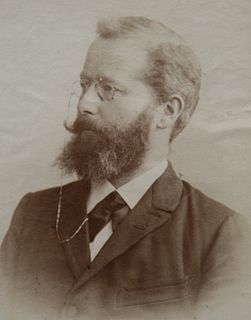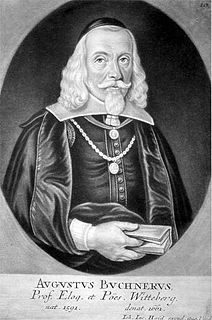
Johann Friedrich Kleuker (born 24 October 1749; died 1 June 1827 in Kiel) was a German Protestant theologian and University professor. [1] [2]

Johann Friedrich Kleuker (born 24 October 1749; died 1 June 1827 in Kiel) was a German Protestant theologian and University professor. [1] [2]
In 1770 Kleuker started his studies in theology, philology and philosophy at the Georg August University of Göttingen. In 1773 started working as a tutor in Bückeburg, where he became friends with Johann Gottfried Herder. In 1775 Herder gave Kleuker the position of vice-rector in Lemgo. In 1778 he became a secondary school principal in Osnabrück. In 1798 Kleuker became professor of theology at the University of Kiel. [3] [4] [5]
Francis Lambert was a Protestant reformer, the son of a papal official at Avignon, where he was born between 1485 and 1487.
Theodor Kolde was a German Protestant theologian, born at Friedland in Silesia.
Friedrich Blume was professor of musicology at the University of Kiel from 1938–1958. He was a student in Munich, Berlin and Leipzig, and taught in the last two of these for some years before being called to the chair in Kiel. His early studies were on Lutheran church music, including several books on J.S. Bach, but broadened his interests considerably later. Among his prominent works were chief editor of the collected Praetorius edition, and he also edited the important Eulenburg scores of the major Mozart Piano Concertos. From 1949 he was involved in the planning and writing of Die Musik in Geschichte und Gegenwart. Coincidentally he died within a few weeks of another prominent Mozart musicologist, Cuthbert Girdlestone, and was thus almost his exact contemporary.

Julius August Philipp Spitta was a German music historian and musicologist best known for his 1873 biography of Johann Sebastian Bach.
Since the 18th century Berlin has been an influential musical center in Germany and Europe. First as an important trading city in the Hanseatic League, then as the capital of the electorate of Brandenburg and the Prussian Kingdom, later on as one of the biggest cities in Germany it fostered an influential music culture that remains vital until today. Berlin can be regarded as the breeding ground for the powerful choir movement that played such an important role in the broad socialization of music in Germany during the 19th century.
Volkslied is a genre of popular songs in German which are traditionally sung. While many of them were first passed orally, several collections were published from the late 18th century. Later, some popular songs were also included in this classification.

Benno Erdmann was a German neo-Kantian philosopher, logician, psychologist and scholar of Immanuel Kant.

Johann Heinrich Schrörs was a German Catholic church historian.
Carl Schmidt was a German Coptologist. He made editions of various Coptic texts, and was active in Egypt in purchasing papyri for German universities. He also assisted Sir Chester Beatty in his papyri purchases.
Friedrich Wilhelm Stein was a German theologian, conductor, musicologist and church musician. He found in an archive in Jena the score of the so-called Jena Symphony, which he published as possibly a work by the young Ludwig van Beethoven. After a long period in Kiel from 1919 to 1933, teaching at the Kiel University and as Generalmusikdirektor, he had a leading position in the Reichsmusikkammer of the Nazis in Berlin.

Gustav Friedrich Dettmar Philippi was a German archivist and historian.
Gustav Wilhelm Frank was a German-Austrian Protestant theologian, known as the author of a multi-volume work on the history of Protestant theology.
Wilhelm Germann was a German Protestant theologian and missionary.
Karl Günther Ernst Felix Becker was a German art historian, best known today for the project Thieme-Becker.

August Buchner was a German philologist, poet and literary scholar, an influential professor of poetry and rhetoric at the University of Wittenberg.
Wolfram Steinbeck is a German musicologist.
Helmuth Osthoff was a German musicologist, university professor and composer.
Michael Heinemann is a German musicologist and university professor.
Arno Forchert was a German musicologist.
Gustav Mensching was a German theologian who was Professor of Comparative Religious Studies at the University of Bonn from 1936 to 1972.